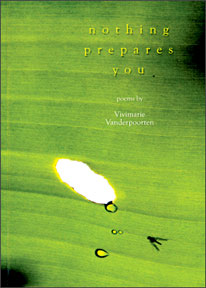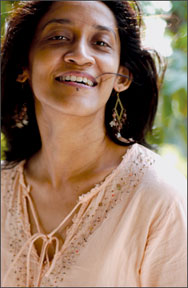 Caricature
of life through poetry Caricature
of life through poetry
Gratiaen Prize Winner 2007:
Q: Why do you think the Sri Lankan literature in English is
slender and imprisoned within the context of island mentality and little
known about it ahead of our loam? How do you describe this predicament?
What are the short term and long term solutions that one can find to
viaduct this communication gap?
A: I would disagree. I don’t think it is slender or
imprisoned. I think people write within context of our reality so much
to write about in the present context of violence. I do agree that it is
not well-known enough outside. I do not know whether that has to do with
what we write about or more practical things like publication, publicity
etc.
|

Vivimarie Van Der Poorten- Young but matured....... a writer
with a futuristic outlook....... |
Q: The concept of hybridity and cultural otherness are also
linked to Literature. Can you explain the concepts? How do you think Sri
Lankans would welcome the ideas of hybridity, cultural identity,
otherness especially in the present context of acrimonious ethnic
relationships?
A: I am not an expert of literature. My expertise, if at all,
is on applied linguistics. Hybridity, I think, is given in the context
of our world today. I do not think anybody is pure or literature. All
people are hybrid in terms of race, attitudes, and multiple identities.
Literature is the best way to express ‘hybridity ‘and ‘cultural
otherness’.
Otherness is something which we have to accept whether we like it or
not. I consider myself as hybrid. I am hybrid. I have always taken it as
a resource and something to be proud of other than ‘otherness’.
‘otherness’ is something that how others perceive you. I think some Sri
Lankans accept ‘otherness’ and some do not.
For those who accept it, well they are enriched. I think war is
something totally different, it is political.
But accepting other people for what they are and not-stereotyping
people about human relationships and I would separate the two. I think
that there is no excuse; you have to accept people who are different
from. Because that’s what makes life interesting that people are
different. If all of us thought and looked and accepted everything,
there would be no literature.
Q: How can Sri Lankan writers in general and especially who
are dwelling on foreign soil, in particular, use English language and
textualise a distinct Sri Lankan sensibility?
A: I have never lived abroad for a long period of time. So I
really did not know. But some have done very successfully like Shyam
Selvadurai. He has articulated it very well. You read ‘Funny Boy’; you
don’t think this is somebody who lives abroad.
Q: “Nothing Prepares you”, your maiden collection of poems,
has won the coveted Gratiaen Award. What is your view on the award and
the contemporary Sri Lankan writing in English?
A: I think it is really a great thing and I would have said
even before, I was a judge last year. I think the fact there were 57
entries this year would answer this question. If it was an award that
has to be scorned and as people have done in media, then why have 57
young aspiring writers or established writers!
|

Challenging obsolete ideology |
My view on the award is that is a very encouraging thing that has
happened to the literary scene. Contemporary writing in English is at
the present moment more flourishing than ever that I can remember. There
are more publishers. There are more people aspiring to write. It seems
to me that contemporary writing is alive and well. I like the work I
read.
Q: “Nothing Prepares You” offers an anthology of poems that
touches on diverse themes ranging from nostalgic memories of the past to
prejudices such as colour-bar and how Asians are perceived by
Westerners. Are those poems such as “Meeting in South London” born out
of your personal experiences? How do you perceive Diasporic experience
as a recurrent theme which depicts the issues confronting the Sri
Lankans domiciled beyond shores and those Sri Lankans visit European
destinations?
A: All my love poetry or most of them are born out of my
personal experiences. As I said earlier, I have not lived abroad for
long periods of time. I have been for two years, for three years etc.
just for study. I haven’t really lived abroad in that sense. But I am
sure my poetry depict only the issues those that were unpleasant.
But there were far more pleasant memories. I write about sad things,
for example, about conflict etc. Among my few poems that talk about
racism that I have experienced are “You’re Welcome’ and “Doppelganger”.
In “Doppelganger” I tried to say how I experienced racism here and
there. So I have always felt like an outsider. So when you have
experienced racism within your own country in forth grade, then when I
went abroad, I got the same experience. So, where is my home? On account
of my hybridity, my surname, as a child, I always tried to find out who
I was and what race am I belonged to?
It took up time, it took some growing up to understand that you do
not have to be either a Sinhalese or a Eurasian. You can be a good
combination of both. My early poetry is an effort trying to come to
terms with the identity issue. Because I had a very strong Buddhist
heritage from my father’s mother and my father’s father was a Eurasian
of Belgian, Dutch heritage.
So I had to negotiate with these two identities. In “You’re Welcome”
and “Visiting Giants” I was stuck by more than racism. Some American
tourists inquired whether I was from Africa. It is about Sri Lanka.
Q: In the poem “Decree Nisi” you have not only described the
institution of marriage in Sri Lanka but also how state intervenes in
private lives, please comment.
A:I think that marriage in a bureaucratic sense is an invasion
into private Lives. But I think it is necessary. We all would go and do
it because it is only the socially sanctioned way to relationships to go
on in this country. But I think more young people are choosing to live
together. But that I think is a very personal poem. I wrote it when I
was going through the ‘decree Nisi’.
Q: Why do you utilise Japanese Haiku form of poetry in the
anthology? Is there a special reason for it? The poem “Protecting Faith,
September 2006’ is about how security measures have, to a certain
extent, destroyed the sanctity of the Temple of the Tooth, do you think
that Haiku style is the most effective form that can be used for this
poem?
A: I used to teach Haiku to my students as a young Assistant
Lecturer. I wanted to write something other than free verse. I wanted to
see how I could compress myself into that form. Haiku is a form where
there is one thought, one image. Actually, I meant to write about the
beauty of nature but I hardly used it for the beauty of nature.
|

Far ahead of of behind-the-time ideas |
I have used Haiku to write about grotesque realities of war. I wrote
one for my cousin who died in a land mine explosion with Nihal de Silva.
She lost her family in the Tsunami and then re-married and she died with
her new husband in that bomb blast. For me it was unbelievably sad. I
want to articulate it in some way. So I wrote it in Haiku.
Q: The poem “Protecting faith “says that how security measures
destroyed the sanctity of the Temple of the Tooth. Please comment.
A: I went to the Dalada Maligawa with a friend of mine. Irony
struck me. We took the alms with both our hands to the entrance. Then
there were soldiers and it had to be scanned. I was aware the necessity
of it and at the same time, it in a way violates the sanctity. So that
conflict stuck with me, and I just wrote it on the way back in my
friend’s car.
Q: “Going Home” is one of the poems that belongs to the
category of poems of recollection or of nostalgia. Here the main actor
is time which has devoured everything sacred to you and bringing about a
change, is it based on your personal experience? Please comment.
“I was trying to deal with the death of my father. Yes, it seems to
me that home always meant signs of him. He used to come to the gate to
welcome me. He was the one who planted the tree. Home meant my dad. I
was very close to him. When he died, I just realized that nothing of him
remains. “Talisman” is also about him. Every year on July 23rd I think
about him. That is his death anniversary.”
Q: You have explored the theme fragility of relationships in
the poem “I have today”. It is also about the uncertain nature of life.
The central theme of the poem seems to be ‘to live in the present’. How
did you manage to explore such a complex theme in few lines woven around
a passionate moment of lovers?
A: Yes, I think if you have to seize the moment, love like
everything else ceased, relationships change. In that change there is
pain. That poem deals with my relationship which was uncertain and
fragile and knew it would end. I wrote this poem for that relationship
which was a very special relationship and tribute to the relationship I
have today. Yes, I think we should live in the present all the time. I
say that also as a Buddhist and as somebody who has loved and love
again.
Q: Your style of poetry is lucid as well as rhythmic and I
would rather say’ very much English’ compared to most of the Sri Lankan
writings in English? What is the secret behind this elegant style and
the economy of words in your poetry?
A: I do not know it has something to do with the fact that my
first language is English. But my first language is Sri Lankan English.
I certainly do not speak British English. It’s just the way I write. I
think I write and then work on my poetry again.
Yes, there is, sometimes, an effort so as to what should be
understood by people who are not Sri Lankan. I have a lot of friends who
are non-Sri Lankan who live abroad. I have also shared my poetry with
them. May be the unconscious desire to be understood beyond the shores
of Sri Lanka contributed to this.
Q: The poem “Nothing prepares you” which is the titled poem of
the collection, deals with the subject of pain especially the pain of
“separation”, “Love” and “Loss”. “Love and loss shadow you Silently,
like spies And collides suddenly, Violently Like migraine headache “The
‘love ‘is a recurrent theme in the collection. Please comment on.
“It is such a fundamental emotion and it has built within fundamental
sadness and that inspires me.”
Q: Some people are of the view that we try to embrace any
piece of literature, without considering its impact on our culture and
cultural productions or cultural artifacts. What’s your view?
A: I think embracing or reading a book is very personal.
I do not hang up about our culture. I think culture is very fluid and
dynamic. Culture is changing and any person who can’t accept that I feel
very sorry for them. |
